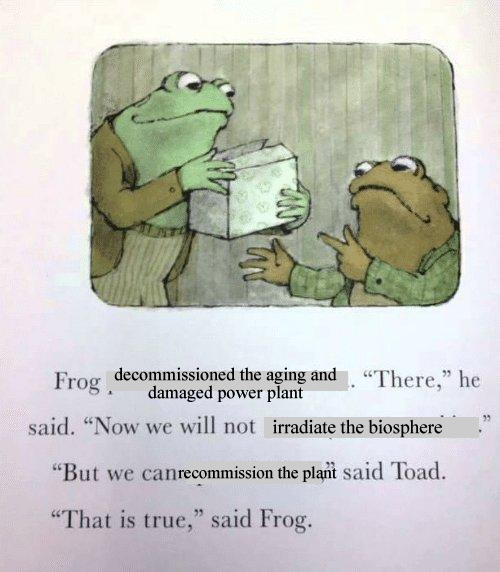- cross-posted to:
- technology@hexbear.net
- cross-posted to:
- technology@hexbear.net
The tax breaks in the Inflation Reduction Act are crucial to making the deal economically feasible, according to Constellation. They provide a credit for every megawatt hour of nuclear energy produced.
The whole energy credit system is a fascist shell game. Instead of imposing transition requirements and bench marks, taxing corporations at higher rates based on their carbon impact, the government creates a speculative asset for these “green” initiatives that become more valuable then the actual product being produced. They can be sold in some cases, or in this case remove “taxes”. But naturally, there are zero stipulations on HOW the energy produced is even used.
If approved by regulators, Three Mile Island would provide Microsoft with the energy equivalent it takes to power 800,000 homes, or 835 megawatts.
So instead of this easing the burden of energy costs on citizens, it eases the tax burden of corporations. Naturally, M$ is using this for bullshit AI slop too.

LOL
This is perfect, I’ve just started reading these to my toddler since someone in the parenting community recommended them
This AI shit is going to make me become the joker
There is so much hype surrounding what is just a rebrand of advancements in machine learning.
And thanks to human ignorance and the average consoomer thinking this tech is magical, we all have to deal with some of the most powerful companies on earth pooling as many resources together as they can to ensure it gets better treatment than most humans.
I don’t see evidence that the chatbot stuff is really drawing in most people.
Must be bias because of my job
Or I’m the biased one!
deleted by creator
😩 I hear talk about LLMs everyday at work. Truly, I wish this shit would be firmly squashed
 Machine Learning
Machine Learning Marxism-Leninism
Marxism-Leninismdeleted by creator
 Machine Learning
Machine Learning Marxism-Leninism
Marxism-Leninism
😡 using nuclear energy to reduce emissions
😍 using nuclear energy to power bullshit generator
Microsoft is also pursuing power from nuclear fusion, a potentially abundant, cheap and clean form of electricity that scientists have been trying to develop for decades — and most say is still a decade or more away from generating electricity. Microsoft has signed a contract to purchase fusion energy from a start-up that claims it can deliver it by 2028.
Lmao what a way to close out the article
I mean, if the AI arms race gets us over the hurdle for cheap fusion energy in the next three years, then I will consider AI to be a net positive for humanity. But I’m not holding my breath.
I keep coming back to this sense that technological advancement has just sort of hit a wall. In the last 20 years we’ve seen processing power become cheaper and not much else. This has given us new, arguably shittier forms of mass media, but nothing really different. And notably it’s given us a parade of bullshit and bubbles pretending to be the Next Big Thing. The VR dream keeps recurring in various forms, 3D displays, 3D printing, blockchain, the gig economy, “AI,” almost everything in the “green” apocalypse mitigation field, and now I guess cold fusion.
The only thing I can see as having real potential is quantum computing, because scaling it up would obsolete fundamental security features of almost every computer on the planet, but that’s still in the early experimental phase and the bullshit artists haven’t figured out how to market it widely.
Funnily enough quantum computing has hit a wall as well.
No, most of the tech advances are happening in China now. It’s the only place with a future.
The promise of quantum computing isn’t to break encryption, that would make it a pointless billions-dollar Y2K-like makework project to reconfigure all our systems to use post-quantum cryptography schemes. Quantum computers are primarily interesting because they promise to get a “native” speedup at simulating quantum-mechanical objects like molecules and proteins. So drug & material design could benefit. However, the field has been stalled for the past decade.
I do disagree that technological advancement has hit a wall, though. Things are moving faster than ever. To choose a single example, the impact of cheap energy-dense lithium batteries has been enormous. Displays also really have improved a lot.
I think 3D printing has potential because it can close the gap between hobbyist crafts and commercial grade manufacturing. Print the item for a run of 25, then you can move up to a real mould for 25,000.
It also leans into repairability-- replacement parts that might not be feasible to whittle one at a time from wood can be reliably made in a plastic comparable of strength to the original, and tge designs shared widely
Oh wow, a start-up claiming to produce miracle technology in 5-10 years time and they just need a bunch funding now to make it a reality. What a new and incredible thing this is and certainly something that will succeed in their goals and isn’t just a ponzi scheme.
this AI push is so fucking funny. my team has lost 3 people in the last few weeks and none of the positions are hiring replacements because the company is choosing to invest in AI instead, and middle management has finally gone from bemused enthusiasm to barely-restrained panic. watching these tech illiterate types suddenly start to sweat as they realise the reality of the situation (which we have all known for months) is great fun. our AI is useless, commands from on high have told management to change how we operate to pin all our hopes on it, and now the CEO is going to watch them drown in exchange for shareholder value
I knew I shouldn’t have used that monkey’s paw to wish for countries to adopt more nuclear power…









